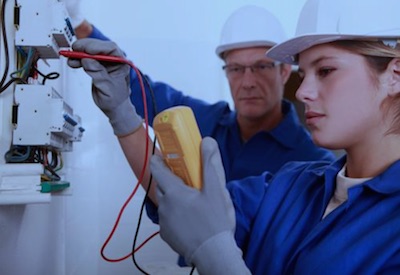IBEW and ECAO Promote Apprenticeship Model for Ontario

Mar 18, 2019
The International Brotherhood of Electrical Workers Construction Council of Ontario (IBEW CCO) and the Electrical Contractors Association of Ontario (ECAO) have released a research paper they believe can assist the provincial government in its quest to introduce apprenticeship reforms.
“We look forward to working with the government to help them develop a model that will work,” says James Barry, Executive Chairman of the IBEW CCO.
The report — A Legacy for the Future: An Apprenticeship System that Works — was developed in response to the Ontario government’s recent announcement of plans to close the Ontario College of Trades and make changes to the provincial apprenticeship system.
“As leaders in training with the highest apprentice completion rates in the electrical industry, we believe we have the experience and knowledge to help the government with its reforms,” continues Barry.
The report — prepared by an independent expert in the industry — looks at apprenticeship systems across the country and what has worked and what has not been successful.
Specifically, IBEW-ECAO proposes that the new system be constructed on the following three pillars.
1. A Red Seal commitment
• Alberta’s apprenticeship system has the highest percentage (3.9%) in Canada of registered apprentices in its labour force. This is because its strong Red Seal commitment ensures apprenticeship completion has real economic value to employers and workers.
• British Columbia’s apprenticeship system has a much lower percentage (2.2%) because it moved to a skill set or modular certification system. This system has now been largely abandoned (90% cancelled) due to negligible economic value for employers and workers.
• Ontario’s new apprenticeship system should focus on real economic value by basing all competency standards, all training standards, all scopes of practice, and all certificates of qualification on the Red Seal standards.
2. ESA enforcement
• Ontario’s former apprenticeship system lacked adequate enforcement mechanisms. Enforcement responsibility should be assigned to the widely respected Electrical Safety Authority (ESA), which already has a statutory mandate to protect the public interest.
• In addition, the ESA should take on administration of ratio rules and compulsory status in the electrical trades as well as authority for changing electrical trade status or responsibility. This would be replicated by similar respected authorities in other trades.
• The cost of these new ESA functions should be funded by a levy on journeypersons, and ministerial oversight of the ESA should be increased.
3. Industry leadership
• Apprenticeship system leadership, in the form of an independent Chief Training Officer, a 7-person board, and a streamlined organization, should be recruited from industry.
• This new apprenticeship system should maximize effectiveness by maintaining authority for both training standards and for managing the delivery of training.
• The mandate to alter the default 1:1 ratio should be vested in the Minister, not an adjudicative process. Default ratio changes would be recommended to the Minister by the Chief Training Officer based on industry engagement and economic forecasting.
“I would encourage our members to read this report and hope business managers arrange to share it with MPPs in their region as well as take the time to offer tours of our training facilities,” says Barry.
“By working with government in a constructive way, we can help ensure we have a skilled workforce for the future that has been trained safely and to the high standards the people of Ontario deserve.”
The report also offers suggestions on how to better promote compliance within the industry.
Read the full report here.











![Guide to the Canadian Electrical Code, Part 1[i], 26th Edition– A Road Map: Section 56](https://electricalindustry.ca/wp-content/uploads/2022/11/Guide-CE-Code-2.png)



